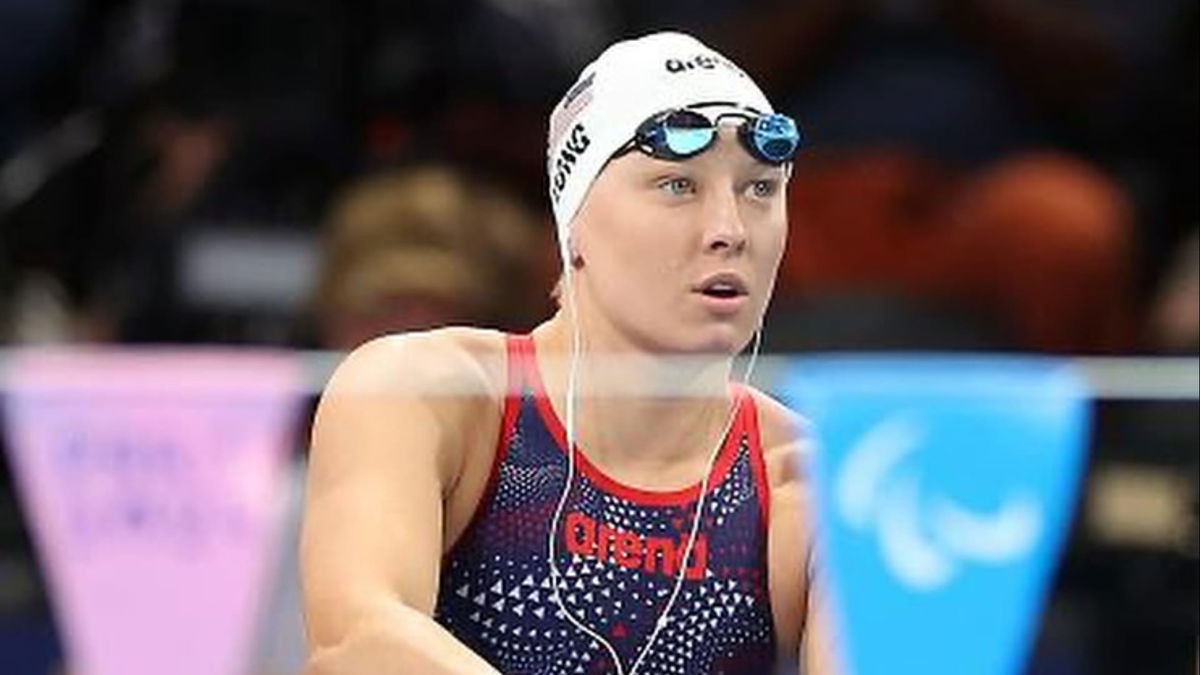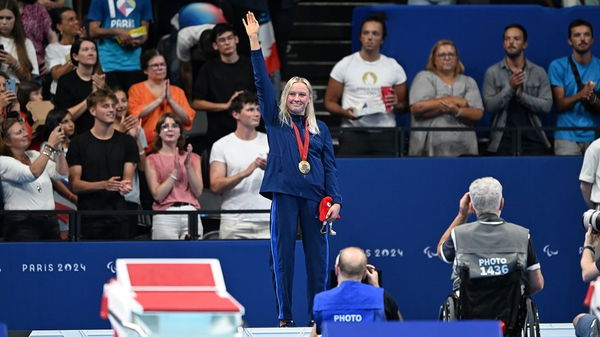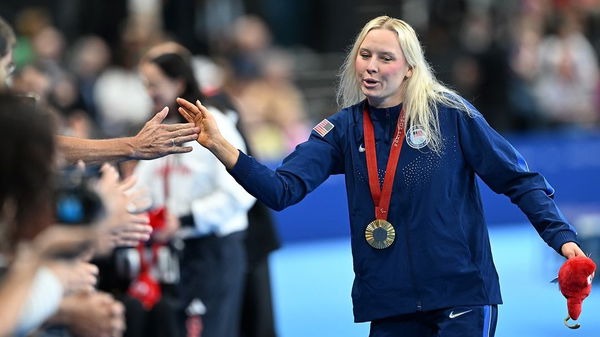

It could have been a fitting end to an extraordinary journey at the Paris Paralympics. Jessica Long is now the second-most decorated American Paralympian in the nation’s history, but she remained defiant. After winning two gold medals at the Paris Games, she was the obvious choice to attend the closing ceremony on September 8. However, attending her sixth consecutive Paralympics wasn’t possible for a frightening reason.
Watch What’s Trending Now!
Almost 10 days after the closing pomp of the Paris affair, several media outlets searched for the exact reason that had made the ‘face of the US Paralympic swimming’ go MIA in that ceremony. It shows Long’s outspoken nature, criticizing one aspect to be the principal reason. Additionally, it connects her to her father as well.
ADVERTISEMENT
Jessica Long faces ban after following her father’s lead
Notably, in the closing ceremony of the Paris Paralympics, four female swimmers from the American camp remained absent. With Gia Pergolini, Julia Gaffney, and Anastasia Pagonis, Jessica Long forms the fourth name. An update from the Washington Post confirms that all of them have been penalized for violating the rules in Paris, as set by the US Olympic and Paralympic Committee. Furthermore, the penalty might cause them to miss the national team through next spring and could result in a loss of stipends. The consequences might extend even further. However, Jessica and her colleagues have the option to file a petition against these sanctions. But what is their offense? According to the report, Long and others questioned a fellow para swimmer’s disability classification in Paris, indirectly challenging the Paralympic classification system—an issue that Jessica’s father had been vocal about in the past decade.

ADVERTISEMENT
At the Paris Paralympics, Raleigh Crossley shattered the world record in the women’s 50m freestyle S9, a milestone that was celebrated playfully by World Para Swimming as it marked the first world record of the Games. In fact, the global paraswimming governing body highlighted the achievement on its Instagram account. However, the spotlight quickly shifted to Jessica Long and Gascon Moreno for their staunch criticism of the achievement.
ADVERTISEMENT
While the latter questioned whether the achievement had been a joke, Long commented, “I stand with you.” Both Gaffney and Pagonis followed the same suit on social media, arguing that the New Jersey native should not have been classified in the S9 category. They claimed that Cross’s disability level was lower, giving her an unfair advantage while competing against swimmers in that category. For this, they attributed to flaws in the Paralympic classification system. However, the governing bodies have not acknowledged their concerns yet. But this wasn’t the first time Jessica Long had criticized the classification system.
Top Stories
NFL Makes Final Punishment Decision on Shedeur Sanders Incident in Week 17

Jerry Jones Finally Acknowledges the Dak Prescott Gamble Hasn’t Paid Off; Confirms Painful Changes Ahead for Cowboys

Chiefs Coach Abruptly Leaves Andy Reid’s Staff Amid Titans’ Rumored Interest in Matt Nagy

“I’d Be Dead”: NASCAR Legend Credits Kevin Harvick for Saving His Life

Two-Time Venezuelan UFC Champion Clears Stance on Trump’s Takeover and Maduro’s Capture

Kyle Whittingham Cuts Ties With Wink Martindale & Five Michigan Coaches in Major Shake-Up

Rather, Jessica and her father, Steve Long, have questioned the classification system that exists in Paralympic swimming again and again. Allegedly, every time the name of the swimmer has changed only. In 2016, Steve went behind two esteemed para swimmers, blaming them for being engaged in the same practice.
ADVERTISEMENT
The questions about the classification system in the Paralympics continue to haunt
In a 2016 interview with SwimSwam, Steve Long highlighted the case of Maddison Elliott, an Australian para swimmer. Elliott competed in the S9 class at the 2015 World Championships, but during her observation race, her limited ability to kick her legs led authorities to move her to the S8 class. However, in subsequent events at the same meet, Elliott demonstrated a much stronger kick, shaving several seconds off her previous times. This prompted Jessica’s father to accuse her of Intentional Misrepresentation (IM). Despite the claims, the issue received little attention.

ADVERTISEMENT
Steve Long later accused British swimmer Stephanie Millward of similar behavior—intentionally hiding her dominant ability to secure placement in a higher disability class in Paralympic swimming. Allegedly, after her observation race, Millward was placed in the S8 class. However, with her ‘higher physical ability,’ she shattered the 100m backstroke world record by almost two seconds in that category. Despite these claims, the International Paralympic Committee sided against Steve Long both times, closing the matter without addressing the concerns. Now, Jessica has followed in her father’s footsteps, but this time it has resulted in a penalty. What happens next in this ongoing saga remains to be seen.
ADVERTISEMENT
ADVERTISEMENT
ADVERTISEMENT

